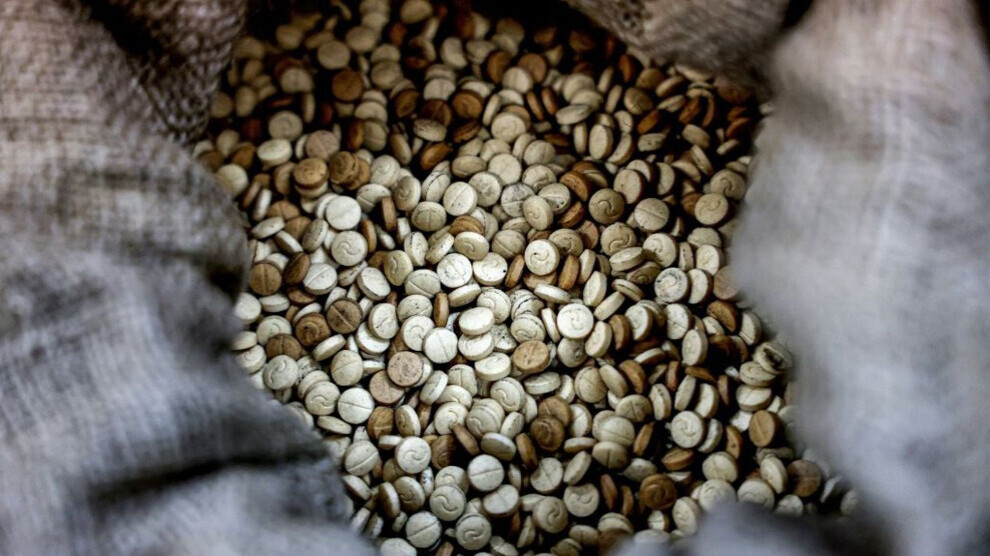Captagon connection: How Syria became a narco-state
Captagon is now by far Syria's biggest export, dwarfing all its legal exports put together, according to estimates drawn from official data by AFP.
Captagon is now by far Syria's biggest export, dwarfing all its legal exports put together, according to estimates drawn from official data by AFP.

A decade of appalling civil war has left Syria fragmented and in ruins, but one thing crosses every front line: a drug called captagon.
The stimulant -- once notorious for its association with Islamic State fighters -- has spawned an illegal $10 billion industry that not only props up the pariah regime of President Bashar al-Assad, but many of his enemies.
It has turned Syria into the world's latest narco state, and sunk deep roots in neighbouring Lebanon as its economy has collapsed.
Captagon is now by far Syria's biggest export, dwarfing all its legal exports put together, according to estimates drawn from official data by AFP.
An amphetamine derived from a once-legal treatment for narcolepsy and attention disorder, it has become a huge drug in the Gulf, with Saudi Arabia by far the biggest market.
AFP interviewed smugglers, a fixer who puts together multi-million dollar deals, and 30 serving and former law enforcement officers from Syria and beyond, as well as diplomats and drug experts in a bid to grasp the scope of the phenomenon.
Hidden behind dark glasses and a mask in the middle of a vineyard in Lebanon’s Bekaa Valley, a fixer and trafficker told AFP how he organized the shipments.
"Four or five big names typically partner up and split the cost of a shipment of say $10 million to cover raw material, transport, and bribes," he said.
"The cost is low and the profits high," he said, adding that even if only one shipment out of 10 gets through, "you are still a winner.”
"There's a group of more than 50 barons... They are one big web; Syrians, Lebanese and Saudis.”
While the Captagon trade spans several countries, many key players have tribal ties, particularly through the Bani Khaled, a Bedouin confederation that reaches from Syria and Lebanon to Jordan, Iraq, and Saudi Arabia.
With Syria the source of 80 percent of the world's supply, according to security services, the trade is at least worth three times its entire national budget.
The Syrian state is at the heart of the trade in Assad-controlled areas, narcotics experts say.
The shadowy network of warlords and profiteers Assad indebted himself to win the war has benefited hugely from it, including Lebanon's powerful Iran-backed Hezbollah group, which experts say plays a significant role in protecting the trade along the Lebanese border.
One major mover is Assad's much-feared brother Maher, the de facto head of Syria's elite unit, the 4th Division.
"Maher al-Assad is one of the main beneficiaries of the captagon trade," said Rami Abdel Rahman, director of the UK-based Syrian Observatory for Human Rights.
"He receives his own share from the profit. Drug money has become a main source to pay the salaries of an armed group affiliated with the 4th Division," he added.
"I work with people in Homs and Damascus who receive the pills from 4th Division depots," a smuggler in the Turkish-dominated region told AFP.
"My job is to distribute the pills here or to coordinate with rebel groups to send them to Turkey," he said.
"This job is very dangerous and very easy at the same time."
The trafficker said he also sold pills to leaders from the Hayat Tahrir al-Sham jihadist group that dominates the Idlib enclave in northwestern Syria.
He said myriad groups working as Turkish proxies and under the rebel umbrella known as the Syrian National Army (SNA) had aggressively moved in on the captagon business recently.
"The area is teeming with rebel groups. It's a jungle, everyone is hungry out there and wants to eat," he said.
He said the new captagon kingpin in the region is Abu Walid Ezza, a commander from the Sultan Murad faction of the SNA.
"He has very good relations with the 4th Division, since he used to be based in Homs," the trafficker said. "He brings excellent pills."
Turkish players are also deeply involved, said one regional judicial investigator.
"Diethyl ether, a kind of chloroform, is one of the main precursors needed for (making) captagon, and most of it enters from Turkey," the source said.